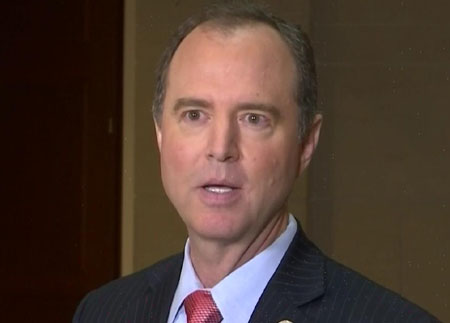by WorldTribune Staff, March 3, 2024
As chair of the House Intelligence Committee during the 116th and 117th Congresses, California Democrat Rep. Adam Schiff did nothing to address the fentanyl crisis.
The latest data available from the Centers for Disease Control and Prevention (CDC) shows that a reported 73,686 overdose deaths from synthetic opioids alone occurred in the United States between September 2022 to September 2023. The figure excludes deaths from methadone.

“If you go to the Intelligence Committee’s webpage that describes its work under his tenure, the word ‘fentanyl’ yields no results. That is to say, the Intelligence Committee under his leadership, by its own account, did nothing on a topic that the Obama administration had declared a threat to our national security in 2017. A search of Schiff’s congressional webpage yields a lone mention of ‘fentanyl,’ a brief reference to a single piece of legislation,” Peter Schweizer reveals in his new book “Blood Money: Why the Powerful Turn a Blind Eye While China Kills Americans“.
Schweizer notes that Schiff, who is running for Senate in 2024, could potentially risk “undue attention to his own financial” ties if he were to address the issue meaningfully.
Schiff has “financial connections to individuals involved with criminal networks in Southern California, many of whom are tied to money laundering and the drug trade,” according to “Blood Money”.
The Democrat congressman’s ignoring of the fentanyl crisis is difficult to fathom given he currently represents California’s 30th Congressional District, which includes Burbank, Hollywood, Glendale, and Pasadena. Schweizer notes that the fentanyl crisis is rampant in upscale Burbank, where at least seven high school students overdosed on the deadly synthetic opioid in 2022 alone.
Now, Schweizer adds, schools in the Burbank Unified School District are required to carry naloxone in the event of overdoses. The effects in the city have been far-reaching.
“In 2022, two men were arrested in Burbank with a hundred thousand counterfeit oxycodone pills laced with fentanyl,” Schweizer notes. “Nineteen-year-old TikTok influencer Cooper Noriega was found dead in a Burbank park with fentanyl in his system.”
Moreover, the Los Angeles area saw fentanyl deaths skyrocket “by a stunning 1,208 percent from 2016 to 2022,” Schweizer reports.
“Why Congressman Schiff has little to say about the deadly fentanyl crisis is an abiding mystery,” Schweizer writes. “Part of the reason may be that raising the issue might cause undue attention to his financial connections to individuals involved with criminal networks in Southern California, many of whom are tied to money laundering and the drug trade.”
Allied Wallet – a “sketchy firm” that “was tied to money laundering, with a major footprint in China” – made one of the top donations to a joint fundraising committee that Schiff established with then-Sen Barbara Boxer (D-CA) in 2017 called PAC for a Change, Schweizer alleges. The $95,000 contribution from the company – which “made money processing credit card payments” for clients described as “‘high risk’ online retailers that traditional financial institutions avoid” – was followed by donations from individual company executives to Schiff’s Congressional campaign, according Schweizer’s Blood Money. One donation came from the company’s head, Andy Khawaja, a dual U.S. and Lebanon citizen who would be embroiled in a federal investigation.
“Schiff’s congressional campaign took in at least $36,000 in donations from executives at Allied Wallet,” Schweizer notes. “Another $16,100 came from Khawaja, and two additional $10,000 contributions came from two other executives of the company. While Schiff was accepting those donations, it was publicly known that Allied Wallet had been under FBI investigation. It was not the first time: in 2010, Allied Wallet had been forced by federal authorities to forfeit $13 million for its involvement in an illegal gambling scheme.”
Schweizer states that Khawaja was seeking “political access,” and with Schiff, he “clearly gained” it.
“At the time Schiff accepted donations from the executives, the company was being investigated for its ties to ‘illegal pharma’ companies around the world. Khawaja threw a lot of money around, clearly in search of political access,” Schweizer writes. “During the 2016 presidential campaign, he first backed Hillary Clinton and then switched to Donald Trump. In the case of Schiff, he clearly gained access. On October 16, 2016, Khawaja and Schiff sat down for a private meeting with Saudi prince Salman bin Abdulaziz Al Saud in Beverly Hills.”
According to Blood Money, China UnionPay – a Chinese state-owned company through which triads launder money – and Allied Wallet had a partnership.
China UnionPay, “a card brand that ‘is often seen as an arm of Chinese state policy,’” has “close ties to the CCP,” Schweizer reports. “UnionPay has been used by organized crime groups and drug traffickers all around the world, including the Chinese triads. Allied Wallet seemed to function ‘as a sort of credit card processor for fraudsters, swindlers, and rip-off artists bilking the public out of more than $100 million.’ ”
“Openly pressing for aggressive action to deal with the Chinese-linked fentanyl networks might lead to open discussions of money-laundering networks operating in the United States and raise some difficult questions for Schiff,” Schweizer argues.
Quality Resource for Citizen Journalists
